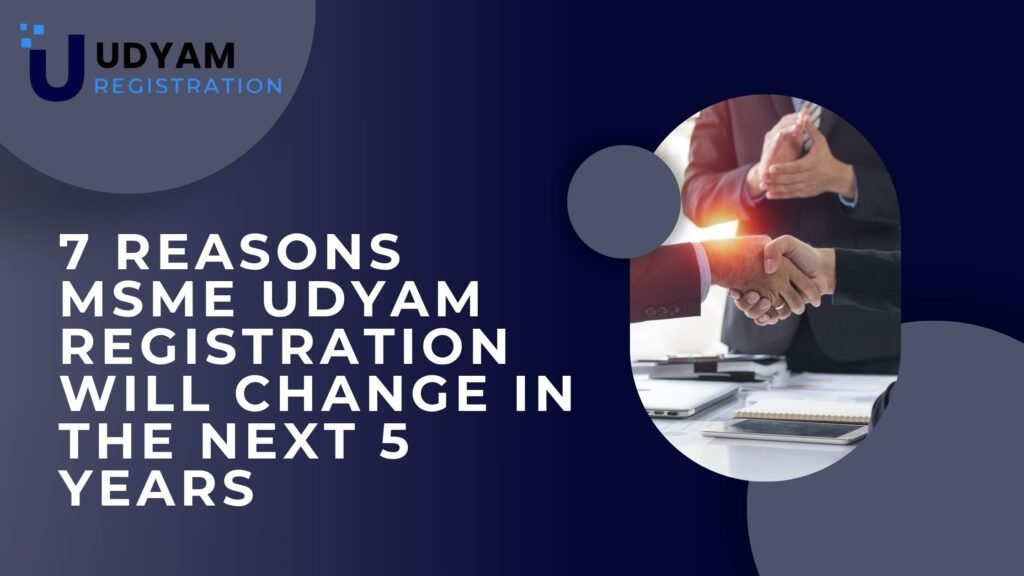7 Reasons MSME Udyam Registration Will Change in the Next 5 Years

In India, MSME registration plays a major role in shaping the future of small businesses. Since the launch of Udyam registration online, lakhs of Micro, Small, and Medium Enterprises (MSMEs) have come under one national identification system. However, the MSME sector is rapidly evolving. As a result, Udyam Aadhar registration is also expected to change over the next 5 years.
In this blog, we will explore 7 strong reasons why Udyam registration will change, how it will affect business owners, and what you can do to stay ahead. If you are planning to register your MSME, keep reading—this might just help you future-proof your business.
1. Introduction of AI & Automation in Registration Process
One of the biggest changes expected in Udyam registration online in India is the use of Artificial Intelligence (AI). The current system already allows businesses to register with just an Aadhaar number. But in the coming years, AI tools may automate verification, validation, and approval processes.
This means:
Faster approvals
Fewer human errors
Better fraud detection
For MSMEs, this will result in a smoother and quicker experience. Service providers like udyamregisteration.org will likely adopt AI-powered platforms to guide users step-by-step with real-time error checks.
2. Mandatory Integration with PAN and GST Databases
Right now, linking PAN and GST details is recommended during Udyam registration. But in the next 5 years, it might become 100% mandatory. The government aims to cross-verify MSMEs’ financial data for better transparency.
Future Udyam registrations may automatically fetch:
Business turnover details from GST returns
PAN-based financial information
Compliance status with tax authorities
If you own a business, it’s wise to keep your PAN and GST records updated. Platforms like udyamregisteration.org can help ensure your documents meet the latest government norms.
3. New MSME Definitions Based on Real-Time Data
Earlier, MSMEs were classified based on investment and turnover. After July 2020, new definitions were introduced. But in the future, the MSME classification may shift to dynamic models using real-time financial data.
For example:
Daily or monthly turnover monitoring
Real-time employment data tracking
Credit utilization from digital payment systems
This could affect your Udyam registration status automatically, depending on how your business performs. Experts at udyamregisteration.org can assist in monitoring your MSME status and re-registration when needed.
4. Digital Verification of Business Operations
Currently, no physical verification is needed after applying for Udyam Aadhar registration. However, to prevent fake or inactive MSMEs, authorities may introduce geo-tagging and online verification.
Expected changes include:
Digital proof of office address
Real-time location validation
Verification through utility bill uploads
Such changes will improve the credibility of registered MSMEs. Businesses should keep proper records and digital proofs ready. Reliable consultants like udyamregisteration.org can help with correct documentation.
5. Centralised Benefits Portal for MSMEs
MSME schemes today are scattered across various ministry websites. But the government is working towards a centralised MSME benefits platform linked directly to the Udyam registration number.
Possible new features include:
One-click application for subsidies, incentives, and schemes
Real-time updates on scheme eligibility
Auto-eligibility check based on Udyam profile
This portal will make it easier for business owners to access the full benefits of being registered under MSME. Make sure your Udyam registration is active and updated, and use service providers like udyamregisteration.org to stay informed.
6. Sector-Wise Policy Changes for MSMEs
In the next few years, different MSME policies may be introduced sector-wise—for example, for manufacturing, retail, export, IT, etc.
Each sector could have:
Different investment thresholds
Special eligibility for incentives
Priority in government procurement
This means Udyam registration may soon require you to specify your sector and sub-sector clearly. Businesses in growing sectors like renewable energy or digital tech may get more support. udyamregisteration.org offers sector-specific MSME advice and will likely play a bigger role in helping businesses get categorized correctly.
7. Regular Re-Verification and Certificate Renewal
As of now, once your Udyam certificate is generated, it’s valid for a lifetime. But that might change. With dynamic classifications and real-time tracking, Udyam certificates may need renewal or re-verification every 2-3 years.
Why?
To ensure businesses are still active
To update turnover and investment details
To keep fraud and inactive units out of MSME benefits
As rules evolve, having experts like udyamregisteration.org in your corner will be critical to renew or re-verify your MSME registration without delays.
What Can MSMEs Do Now to Stay Prepared?
To prepare for the changes in MSME Udyam registration, here are a few practical tips:
Keep your financials clean and GST-compliant
Maintain a digital record of your operations
Update your Udyam profile whenever changes happen
Register through trusted sources like udyamregisteration.org
These steps will ensure you’re always ready for future updates in policy or procedure.
Final Thoughts
The next 5 years are going to be transformational for Indian MSMEs. With digital governance, AI automation, real-time data, and centralised schemes, the Udyam registration online system is bound to evolve significantly.
Whether you’re a startup, a manufacturer, a freelancer, or a trader—your Udyam registration will soon be more than just a certificate. It will be your key to unlock government schemes, business growth, and digital trust.
To ensure a hassle-free and correct registration process, use trusted services like udyamregisteration.org, which help thousands of MSMEs across India get registered, updated, and compliant.
